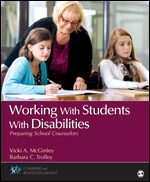Working With Students With Disabilities
Preparing School Counselors
- Vicki A. McGinley - West Chester University, USA
- Barbara C. Trolley - St. Bonaventure University
–Nona Cabral, California Baptist University
Working with Students with Disabilities: Preparing School Counselors is an essential tool for all school counselors in training and in practice with the aim to provide a comprehensive approach to working with students with disabilities in a school setting. As more students with disabilities are being included, school counselors need to have a fundamental understanding of the terminology, laws, principles, collaboration, assessment measures, and psycho-social, diversity issues associated with special education. This text continues in the trend of providing sound, evidenced-based knowledge with practical case examples and guided exercises, making the material 'come alive' and fostering critical thinking.
Working with Students with Disabilities: Preparing School Counselors is part of the SAGE Counseling and Professional Identity Series, which targets specific competencies identified by CACREP (Council for Accreditation of Counseling and Related Programs). To learn more about each text in the series, please visit www.sagepub.com/cpiseries.
“Finally, a book FOR school counselors that specifically addresses the needs of students with disabilities and how we can interface with the team in supporting these students.”
“McGinley and Trolley have brought together in one exceptional volume the vast material that modern school counselors often leave the classroom searching for – how to understand the complexities of the system in regards to students with special needs, how to best collaborate with professionals and families in meeting those needs, and how to best structure interventions and programs to move those students forward across social, emotional, and academic realms.”
“McGinley and Trolley have crafted a text that illuminates the multifaceted responsibilities of school counselors relevant to special education. Faculty, graduate students and practicing counselors alike will find the problem-based learning approach a helpful guide for integrating the content covered in this text into their professional practice.”
“Special education students are frequently the most marginalized group on school campuses. Working with Students with Disabilities: Preparing School Counselors points to ways school counselors can open pathways for creating a learning community that supports all students.”

